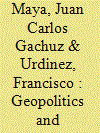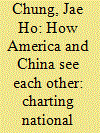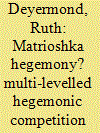| Srl | Item |
| 1 |
ID:
187152


|
|
|
|
|
| Summary/Abstract |
The Bretton Woods institutions have failed to accommodate a rising China, and many authors describe this moment as a crisis of the liberal order, which China is intentionally contesting. The World Trade Organization was incapable of offering a solution to the trade war, and more recently, the World Health Organization was incapable of reducing – and rather partly contributed to – tensions between the US and China in the management of COVID-19 crisis. This Special Issue is made up of six manuscripts that address the most sensitive issues of the China–Latin American relationship amid the challenges of the growing dispute with the United States. The manuscripts assess the four main concerns that are shaping the agenda in China–Latin American relations in times of increasing geopolitical and geoeconomic competition between the United States and China: the Belt and Road Initiative, the One-China policy, the trade war, and the COVID-19 crisis.
|
|
|
|
|
|
|
|
|
|
|
|
|
|
|
|
| 2 |
ID:
165151


|
|
|
|
|
| Summary/Abstract |
Based on the premise that perception operates either as a catalyst or a constraint for a hegemonic war, this study examines ‘national perceptions’ (i.e. how the citizens of the two states view each other) and ‘official views’ (i.e. how the two governments perceive each other) between the US and China of the post-Cold War period. As for the national views, (1) American perceptions of China have generally become more negative than Chinese perceptions of America; (2) little congruence is found between the two powers on key values and norms; and (3) perceptions are generally getting far ahead of the realities. As for the official views, formal documents do not fully reveal their real state of minds. Diplomatic courtesy and strategic self-esteem runs through them. Yet, America’s strategic concern and growing will to manage China from a position of strength is increasingly more discernible. From the Chinese documents, on the other hand, signs of inferiority have gradually disappeared. In sum, perceptions between the two are working more as a catalyst for strategic competition than a constraint on it.
|
|
|
|
|
|
|
|
|
|
|
|
|
|
|
|
| 3 |
ID:
086449


|
|
|
|
|
| Publication |
2009.
|
| Summary/Abstract |
A multi-levelled hegemonic encounter has developed in Central Asia, in which a global hegemon, the USA; a regional hegemon, the Russian Federation; an aspirant sub-regional hegemon, Uzbekistan; and an emergent regional and global hegemon, China, co-exist within the framework of Central Asian security politics. Where these hegemons' interests do not conflict this can be characterised as a matrioshka model of hegemony: the different level hegemons can accommodate one another peacefully and where their interests coincide they can form alliances. The model of multi-levelled hegemony developed here highlights the simultaneous presence of competition and cooperation. This article explores the way in which the various bilateral hegemonic relations in the region also indicate that actual and emergent hegemonic states at different levels can cooperate as hegemons in order to challenge, or to respond to challenge, by hegemonic states at other levels. This helps to clarify the question of whether the increasingly competitive interaction between these states is likely to lead to conflict.
|
|
|
|
|
|
|
|
|
|
|
|
|
|
|
|
| 4 |
ID:
152091


|
|
|
|
|
| Summary/Abstract |
This paper examines whether the US is in a position to adopt restrictive commercial measures against China in order to complement military balancing. It focuses on the necessary condition for serious economic measures against an adversary: the state needs to be sure that it can effectively diminish the adversary's economic performance more than its own. This essay suggests that Washington cannot ascertain that this necessary condition is met in its relations with China. Thus, it might be better for the US to avoid restricting trade with China in any meaningful way, even though bilateral security rivalry intensifies.
|
|
|
|
|
|
|
|
|
|
|
|
|
|
|
|